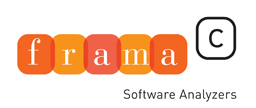
[Frama-C](https://frama-c.com) is a platform dedicated to the analysis of
source code written in C.
## A Collaborative Platform
Frama-C gathers several analysis techniques in a single collaborative
platform, consisting of a **kernel** providing a core set of features
(e.g., a normalized AST for C programs) plus a set of analyzers,
called **plug-ins**. Plug-ins can build upon results computed by other
plug-ins in the platform.
Thanks to this approach, Frama-C provides sophisticated tools, including:
- an analyzer based on abstract interpretation, aimed at verifying
the absence of run-time errors (**Eva**);
- a program proof framework based on weakest precondition calculus (**WP**);
- a program slicer (**Slicing**);
- a tool for verification of temporal (LTL) properties (**Aoraï**);
- a runtime verification tool (**E-ACSL**);
- several tools for code base exploration and dependency analysis
(**From**, **Impact**, **Metrics**, **Occurrence**, **Scope**, etc.).
These plug-ins share a common language and can exchange information via
**[ACSL](https://frama-c.com/acsl.html)** (*ANSI/ISO C Specification Language*)
properties. Plug-ins can also collaborate via their APIs.
## Installation
Frama-C is available through [opam](https://opam.ocaml.org/), the
OCaml package manager. If you have it, simply run:
opam install frama-c
or, for `opam` versions less than 2.1.0:
opam install depext # handles external (non-OCaml) dependencies
opam depext frama-c --install
Frama-C is developed mainly in Linux, often tested in macOS
(via Homebrew), and occasionally tested on Windows
(via the Windows Subsystem for Linux).
For detailed installation instructions and troubleshooting,
see [INSTALL.md](INSTALL.md).
### Development branch
To install the development branch of Frama-C (updated nightly):
opam pin add frama-c --dev-repo
This command will *pin* the development version of Frama-C and try to install it.
If installation fails due to missing external dependencies, try using
the same commands from the [Installation](#installation) section to get the
external dependencies and then install Frama-C.
### Distribution packages
Some Linux distributions have a `frama-c` package, kindly provided by
distribution packagers. Note that they may not correspond to the latest
Frama-C release.
## Usage
Frama-C can be run from the command-line, or via its graphical interface.
#### Simple usage
The recommended usage for simple files is one of the following lines:
frama-c file.c -<plugin> [options]
frama-c-gui file.c
Where `-<plugin>` is one of the several Frama-C plug-ins,
e.g. `-eva`, or `-wp`, or `-metrics`, etc.
Plug-ins can also be run directly from the GUI.
To list all plug-ins, run:
frama-c -plugins
Each plug-in has a help command
(`-<plugin>-help` or `-<plugin>-h`) that describes its own
options.
Finally, the list of options governing the behavior of Frama-C's kernel itself
is available through
frama-c -kernel-help
#### Complex scenarios
For more complex usage scenarios (lots of files and directories,
with several preprocessing directives), we recommend splitting Frama-C's usage
in two parts:
1. Parsing the input files and saving the result to a file;
2. Loading the parsing results and then running the analyses or the GUI.
Parsing typically involves giving extra arguments to the C preprocessor,
so the `-cpp-extra-args` option is often useful, as in the example below:
frama-c *.c *.h -cpp-extra-args="-D<define> -I<include>" -save parsed.sav
The results are then loaded into Frama-C for further analyses or for inspection
via the GUI:
frama-c -load parsed.sav -<plugin> [options]
frama-c-gui -load parsed.sav -<plugin> [options]
## Further reference
- Links to user and developer manuals, Frama-C archives,
and plug-in manuals are available at <br> https://frama-c.com/html/get-frama-c.html
- The [Frama-C documentation page](https://frama-c.com/html/documentation.html)
contains links to all manuals and plugins description, as well as tutorials,
courses and more.
- [StackOverflow](https://stackoverflow.com/questions/tagged/frama-c) has several
questions with the `frama-c` tag, which is monitored by several members of the
Frama-C community.
- The [Frama-c-discuss mailing list](https://groupes.renater.fr/sympa/info/frama-c-discuss)
is used for announcements and general discussions.
- The [Frama-C blog](https://frama-c.com/blog) has several posts about
new developments of Frama-C, as well as general discussions about the C
language, undefined behavior, floating-point computations, etc.
- The [Frama-C public repository](https://git.frama-c.com/pub/frama-c)
contains a daily snapshot of the development version of Frama-C, as well as
the [issues tracking system](https://git.frama-c.com/pub/frama-c/issues),
for reporting bugs.
These [contribution guidelines](CONTRIBUTING.md) detail how to submit
issues or create merge requests.